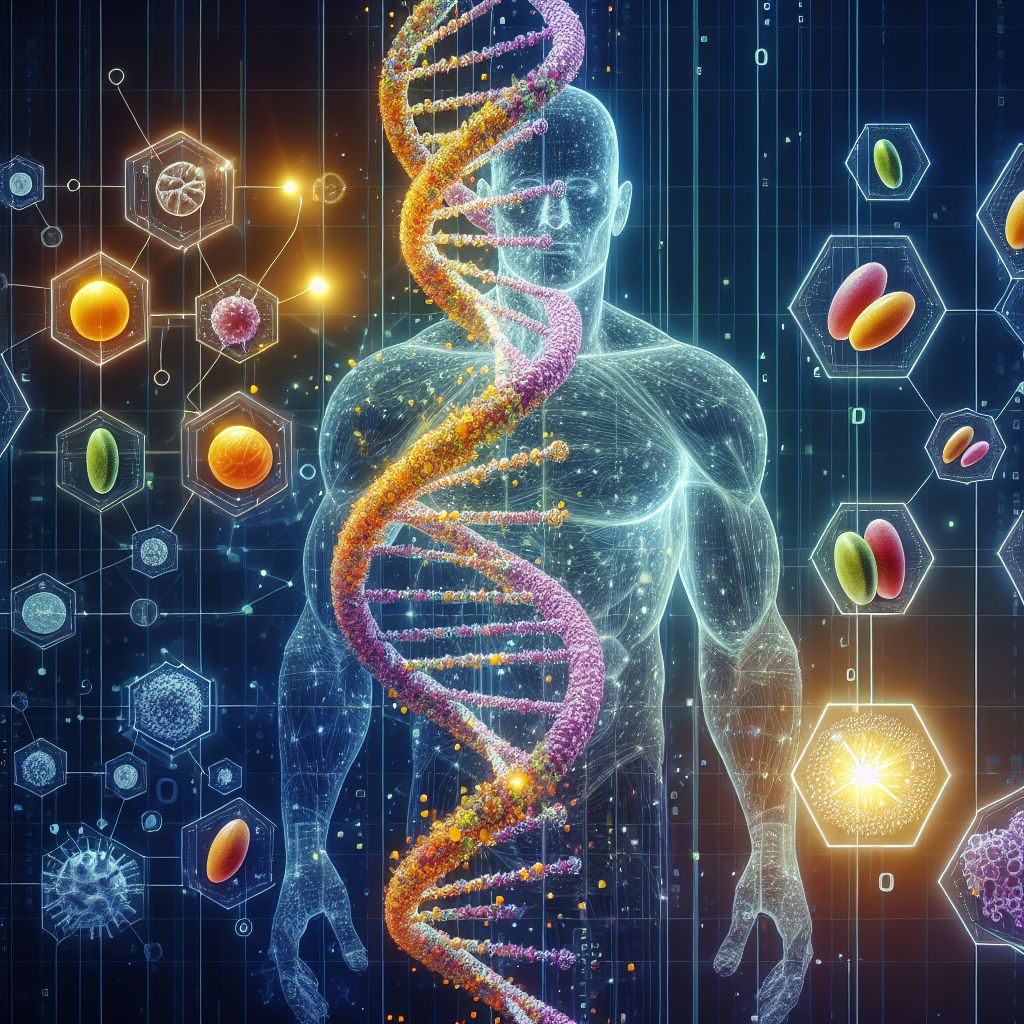Human Design and Vitamins: Personalized Health

Discover your unique Human Design and learn how personalized vitamins can enhance your health. Start your journey towards personalized health today at Vibrant Vitality.
Exploring the Connection Between Human Design and Vitamin Intake
Human Design, a system that combines astrology, the I Ching, Kabbalah, Hindu-Brahmanic system, and quantum physics, is increasingly being used to understand individuality and personal health. It provides a blueprint of our unique genetic makeup, offering insights into our strengths, weaknesses, and potential health issues. Recently, there has been a growing interest in the connection between Human Design and vitamin intake, with the belief that understanding one’s design can guide personalized health and nutrition.
The Human Design system categorizes individuals into four types: Manifestors, Generators, Projectors, and Reflectors. Each type has a unique way of interacting with the world and specific nutritional needs. For instance, Manifestors are known for their initiating energy and may benefit from vitamins that support their active lifestyle, such as B-vitamins for energy production and Vitamin D for bone health. Generators, the powerhouse of the Human Design types, may require a higher intake of antioxidants like Vitamin C and E to combat the oxidative stress from their constant energy output.
Projectors, on the other hand, are recognized for their ability to guide and manage others. They may benefit from vitamins that support cognitive function and stress management, such as B-vitamins and magnesium. Lastly, Reflectors, who are sensitive to their environment, may need a balanced vitamin intake to support their overall well-being and immune system.
However, it’s not just the type that influences vitamin needs. The Human Design system also includes Centers, which are akin to energy hubs in our body. For example, an undefined Throat Center may indicate a potential for communication issues and thyroid problems. In this case, vitamins that support thyroid health, such as iodine and selenium, may be beneficial.
Moreover, the Gates and Channels in Human Design, which represent specific genetic traits, can also provide insights into our health. For instance, Gate 46, known as the Gate of the Body, is associated with the love of physical life. Individuals with this gate may have a higher need for vitamins that support physical vitality, such as Vitamin A for eye health and Vitamin K for blood clotting.
While the connection between Human Design and vitamin intake is intriguing, it’s important to remember that it’s a complementary approach to health. It doesn’t replace traditional medical advice or nutritional guidelines. Instead, it offers a personalized perspective on health, encouraging individuals to tune into their bodies and make informed decisions about their nutrition.
Furthermore, the Human Design system is complex, and interpreting it requires a deep understanding of its components. Therefore, it’s recommended to consult with a certified Human Design analyst or a healthcare professional before making any significant changes to your vitamin intake.
In conclusion, the exploration of the connection between Human Design and vitamin intake opens up a new avenue for personalized health. It provides a unique lens to view our health, taking into account our genetic makeup and individuality. As we continue to understand more about our unique designs, we can make more informed decisions about our health, including our vitamin intake. This approach not only empowers us to take charge of our health but also promotes a holistic view of well-being.
Personalized Health: Tailoring Vitamin Regimens Based on Human Design

Human Design, a system that combines astrology, the I Ching, Kabbalah, Hindu-Brahmin chakra model, and quantum physics, is increasingly being used to personalize health regimens, including vitamin intake. This innovative approach to health and wellness is based on the belief that each person has a unique design, which can be used to guide decisions about diet, exercise, and even vitamin supplementation.
The Human Design system categorizes individuals into four types: Manifestors, Generators, Projectors, and Reflectors. Each type has its own specific needs and characteristics, which can be used to tailor a personalized health regimen. For instance, Manifestors are believed to have a strong need for certain B vitamins, which support their natural energy and drive. Generators, on the other hand, may benefit from a balanced multivitamin to support their sustained energy levels. Projectors, who are thought to have a more sensitive energy system, may require a carefully selected combination of vitamins to support their overall health. Reflectors, the rarest type, may benefit from a highly individualized vitamin regimen based on their unique needs and sensitivities.
The Human Design system also takes into account the individual’s specific centers, channels, and gates, which are believed to correspond to different aspects of the physical, mental, and emotional self. For example, an individual with a defined Throat Center, which is associated with communication and expression, may benefit from vitamins that support the health of the throat and vocal cords, such as vitamin C and zinc. Similarly, an individual with a defined Solar Plexus Center, which is associated with emotions and intuition, may benefit from vitamins that support emotional health and balance, such as B vitamins and magnesium.
In addition to these specific recommendations, the Human Design system emphasizes the importance of listening to one’s own body and intuition when it comes to health and wellness. This means that while certain vitamins may be recommended based on an individual’s design, it is ultimately up to the individual to determine what feels right for them. This approach encourages individuals to take an active role in their own health and wellness, rather than relying solely on external advice or guidelines.
While the Human Design system offers a unique and personalized approach to health and wellness, it is important to note that it is not a substitute for professional medical advice. Individuals should always consult with a healthcare provider before starting any new vitamin regimen or making significant changes to their diet or lifestyle. Furthermore, while the Human Design system can provide valuable insights into an individual’s unique needs and characteristics, it is not a diagnostic tool and should not be used to diagnose or treat any medical conditions.
In conclusion, the Human Design system offers a novel approach to personalized health, including the tailoring of vitamin regimens. By taking into account an individual’s unique design, this system can provide personalized recommendations for vitamin supplementation, which can support overall health and wellness. However, as with any health regimen, it is important to consult with a healthcare provider and to listen to one’s own body and intuition.
The Role of Human Design in Determining Optimal Vitamin Consumption
Human Design, a system that combines astrology, the I Ching, Kabbalah, Hindu-Brahmanic system, and quantum physics, is increasingly being recognized for its potential role in personalized health. This system, which provides a unique ‘design’ for each individual, is believed to offer insights into one’s physical, mental, and emotional constitution. As such, it is being explored as a tool for determining optimal vitamin consumption, thereby contributing to a more personalized approach to health and wellness.
The premise of Human Design is that each person has a unique energy blueprint, which can be used to understand their strengths, weaknesses, and overall health tendencies. This blueprint is determined by the position of the planets at the time of one’s birth, and it is represented as a body-graph that maps out the different energy centers within the body. Each energy center corresponds to a specific aspect of one’s being, such as the mind, emotions, communication, or physical health.
In the context of vitamin consumption, the Human Design system suggests that each individual may have different nutritional needs based on their unique design. For instance, someone with a defined Sacral center, which is associated with life force and vitality, may require a higher intake of certain vitamins to support their energy levels. Conversely, someone with an undefined Sacral center may need to be more cautious with their vitamin intake, as they could be more sensitive to the effects of certain nutrients.
This personalized approach to vitamin consumption aligns with the growing trend towards personalized nutrition, which recognizes that a ‘one size fits all’ approach to diet and nutrition may not be optimal for everyone. By understanding one’s unique Human Design, individuals can potentially tailor their vitamin intake to better support their overall health and wellbeing.
However, it’s important to note that while Human Design can provide valuable insights, it should not replace professional medical advice. The system can serve as a guide, helping individuals to understand their bodies better and make more informed decisions about their health. But when it comes to determining specific vitamin needs, it’s always best to consult with a healthcare professional. They can provide personalized advice based on a comprehensive understanding of one’s health history, current health status, and specific nutritional needs.
Moreover, while vitamins are essential for maintaining good health, they are just one piece of the puzzle. A balanced diet, regular exercise, adequate sleep, and stress management are all equally important for maintaining optimal health. Therefore, while Human Design can help guide one’s vitamin consumption, it should be used as part of a holistic approach to health and wellness.
In conclusion, the Human Design system offers a unique and personalized approach to understanding one’s health. By providing insights into one’s unique energy blueprint, it can potentially guide individuals in tailoring their vitamin consumption to better support their overall health. However, it’s important to remember that this system should be used as a guide, not a replacement for professional medical advice. As we continue to explore the potential of personalized health, the role of Human Design in determining optimal vitamin consumption is certainly an exciting area to watch.